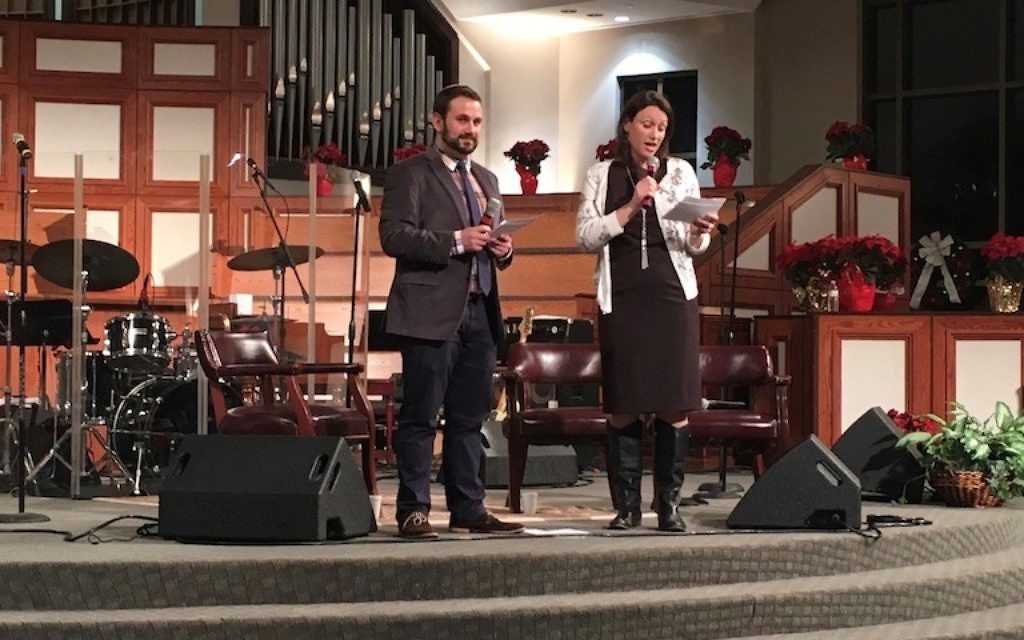Jews Called to Apply Privilege to Renew Civil Rights
The Ebenezer Baptist Church in Atlanta was the site of a discussion on relations between Jews and the African-American community.

Conservative Jews gathered at Martin Luther King Jr.’s church heard a call for a renewal of the spirit that motivated Rabbi Abraham Joshua Heschel to pray with his feet by marching beside King more than 50 years ago.
With USCJ CEO Rabbi Steven Wernick as the moderator, Anti-Defamation League CEO Jonathan Greenblatt and Ebenezer Baptist Church Associate Pastor Natosha Reid Rice spoke to United Synagogue of Conservative Judaism convention attendees Sunday night, Dec. 3, about “where Jews and African-Americans need to go at this moment in history.”
“You just have to give me a moment to appreciate that I am sitting right here, right now,” Rabbi Wernick said before recounting the Jewish community’s participation in the civil rights movement, including the march in Selma, Ala., where Rabbi Heschel famously said, “I’m praying with my feet.”
Get The AJT Newsletter by email and never miss our top stories Free Sign Up
Rabbi Wernick asked about the Jewish community’s present role in race relations. Greenblatt spoke of successes over the years and urged fellow Jews to put “opportunities to good use” on the still-prevalent issues of civil rights and criminal justice reform.
“Don’t remember, renew” the commitment to those causes, Greenblatt said. He added that Rabbi Heschel acted but also prayed. “I’m all for tikkun olam, but we got to know Torah as well. Spiritual renewal doesn’t just happen on the street; it happens in shul as well.”
“Amen,” Reid Rice said.

She said more uncomfortable conversations are necessary. “I think we need to do more discomforting of the comforted and more comforting of the discomforted.”
Reacting to Greenblatt’s use of “renew” for the civil rights movement, she said, “We really need to pick up where it left off, rather than trying to redo what it did already.”
She spoke of remembering the early King but said he was assassinated at a time when he was causing disruption on issues such as economic justice and affordable housing. Early talk about having a dream didn’t disturb reality, but his later subject matter did.
“Justice in both of our faiths means expanding the land” to provide space for more than one type of people, Reid Rice said. She spoke of courageous moments during the journey through the desert and said that confronting uncomfortable things is necessary to go “into the land we called promised.”
Rather than love each person with equality, she said, we should love people according to their needs, applying creativity “with a listening ear and a courageous heart.”
Greenblatt raised the idea of privilege, and Reid Rice said we must acknowledge why we don’t like to talk about privilege. “We don’t want to be made to feel guilty because we’ve succeeded and acquired and done.”
She broke down what privilege means in American society, translating it as having power and the ability to influence conversations, opinions and the lives of others who might not be in your household. She said she would love to hear from someone “not of color pointing out the injustices that have happened to people of color.”
She spoke of the injustices at the root of the Black Lives Matter movement, and of the fears of a mother of two young children. She said
“I want to see you at the forefront” of the Black Lives Matter movement, responding to the injustices at its root, she said, but “not taking the movement over.”
She paused as the audience laughed, then said, “I’m so glad you got that. There’s a difference, right? Not taking the movement over, but saying, ‘What can I do? … How can I pray with my feet in this moment?’”
Another way to exercise privilege, Reid Rice said, is to use your position or capacity for good. “Be the voice that rights that wrong … so that those who are rendered invisible” are heard.
“Be the one that echoes that voice,” she said.
Greenblatt said that is the Jewish community’s greatest opportunity for improvement. “If you don’t show up, we get shut out,” he said. “We have got to show up, even if it doesn’t feel like it’s our issue.”
He doesn’t like the term “social justice,” he said. “It is just justice.”
Asked what would be the charge if King or Rabbi Heschel were alive, Greenblatt encouraged engagement, saying, “When you see hate, don’t roll your eyes. Roll up your sleeves and get involved.”
He said people must remember what it’s like not to have the privileges we enjoy. “It’s essential, essential, that we honor what we’ve got by helping those that haven’t got it.”
Reid Rice invoked King’s “Letter From Birmingham Jail,” in which he wrote of interrelatedness, saying, “What happens to one, happens to all”; “Injustice for one is injustice for all”; and “I can never be the best that I can be, until you become the best that you can be.”
“Really embracing that is revolutionary,” Reid Rice said. “That’s what encouraged me to be here today. Because whatever I believe justice to be, I can’t get there without you.”
Photos by Leah R. Harrison




comments